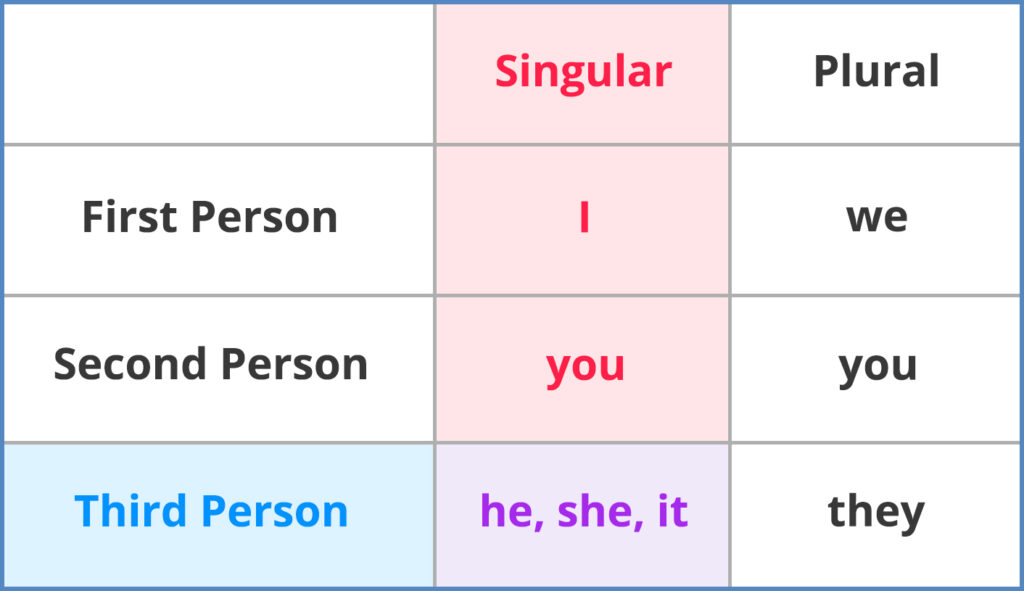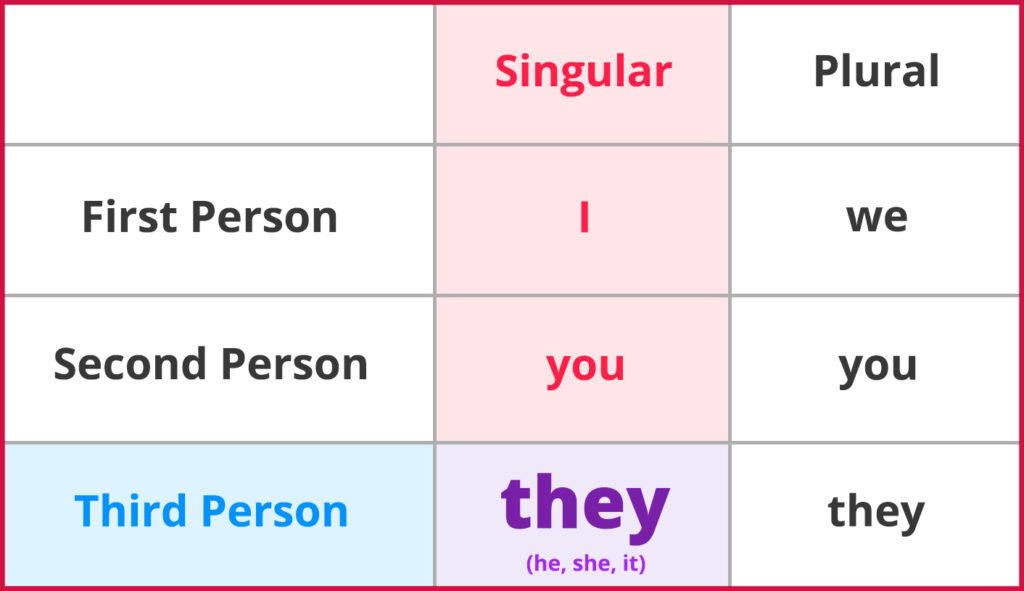Singular "They" and How to Use it

Can you spot what pronouns are used in the following dialogue?

You may be surprised to see that Nina and Zach use plural pronouns ("they," "them," and "their") to refer to one person. Shouldn't they be using "he or she" instead?
Today, we'll explain why and how native English speakers use "they" to refer to one person.
- What are Third Person Singular Pronouns?
- What's Wrong with "He or She"?
- Why Use "They"?
- How to Use Singular "They"
1. What are Third Person Singular Pronouns?
First, let's review what third-person singular pronouns are. In English class, you probably saw a chart of pronouns like the following.

- The blue "Third Person" row contains pronouns for people or things that are not a part of the conversation.
- The red "Singular" column contains pronouns that refer to only one person or thing.
- The purple box contains pronouns which are both third person and singular.
So when people use "they" to refer to one person, they put it in their list of "singular pronouns." That's why it's called the "singular 'they'."

2. What’s Wrong With “He or She”?
Traditionally, "he" and "she" were the only third-person singular pronouns that referred to people. So if you didn't know someone's gender, you would refer to them as "he or she" in formal speech and writing.
However, "he or she" can be awkward and tiring to use. For example, imagine having to say sentences like these every day:
- A patient left his or her wallet in the waiting room. The staff are trying to figure out who he or she was, so they can return the wallet to him or her.
- If you ask your teenager how his or her day was, chances are he or she won't say much. A teenager likes to keep things to himself or herself.
3. Why Use “They”?
When you don't know someone's gender, it's a lot easier to use "they" than "he or she." However, people don't use it just because it's convenient.
Singular "they" is also grammatically correct. Famous writers like Shakespeare and Jane Austen used it. And more generally, native English speakers have been using it since at least the 14th century.
There's not a man I meet but doth salute me
- Shakespeare in A Comedy of Errors
As if I were their well-acquainted friend
I say nothing of which I am ashamed ... Let every body on the Hill hear me if they can."
- Jane Austen in Emma
In addition, unlike "he or she," "they" is gender-neutral. This means that it's a respectful way to refer to someone who doesn't identify as male or female.
4. How to Use Singular “They”
When You’re Not Referring to a Specific Person
In English, people use pronouns like "anybody," "everyone," "someone," and "who" when they aren't referring to a specific person. You can use singular "they" in place of these pronouns.
- If anyone asks, tell them I'm at the hospital.
- Everyone in our family has their own room.
- Who left their lunch on my desk?
You can also use singular "they" when you talk about a group of people in general.
- Every child needs their parents.
- A teacher should care about their students.
- The boys in this class need to learn to behave themselves.
When You’re Referring to a Specific Person
You can also use "they" when you're referring to a specific person, but you don't know their gender or don't want to reveal it.
- You met the new HR director, right? What are they like?
- This person's name has been changed for their privacy.
You should also use "they" to refer to someone if you don't want to assume their gender or they've told you that's their preferred pronoun.
- This is my friend Paul. They like to ski.
- Have you met Sharon? They're our new neighbor.
“Themselves” or “Themself”?
The reflexive form of "them" is "themselves": e.g. "The kids made themselves sandwiches." Does this mean that the reflexive form of singular "them" is "themself"?
In everyday conversation, both are fine. Most people won't notice which one you're using.
- Did someone hurt themself yesterday?
- Did someone hurt themselves yesterday?
However, "themself" is not yet widely accepted in formal English. So when you're speaking or writing formally, it's safer to use "themselves" or avoid the reflexive pronoun altogether.
- Did someone hurt themselves yesterday?
- Did someone get hurt yesterday?
Want to Learn How English is Actually Spoken?
If you want to learn more about real-world English or practice your speaking, book a lesson with a professional English tutor. At Engoo, we have thousands of tutors available 24/7. Sign up here.



